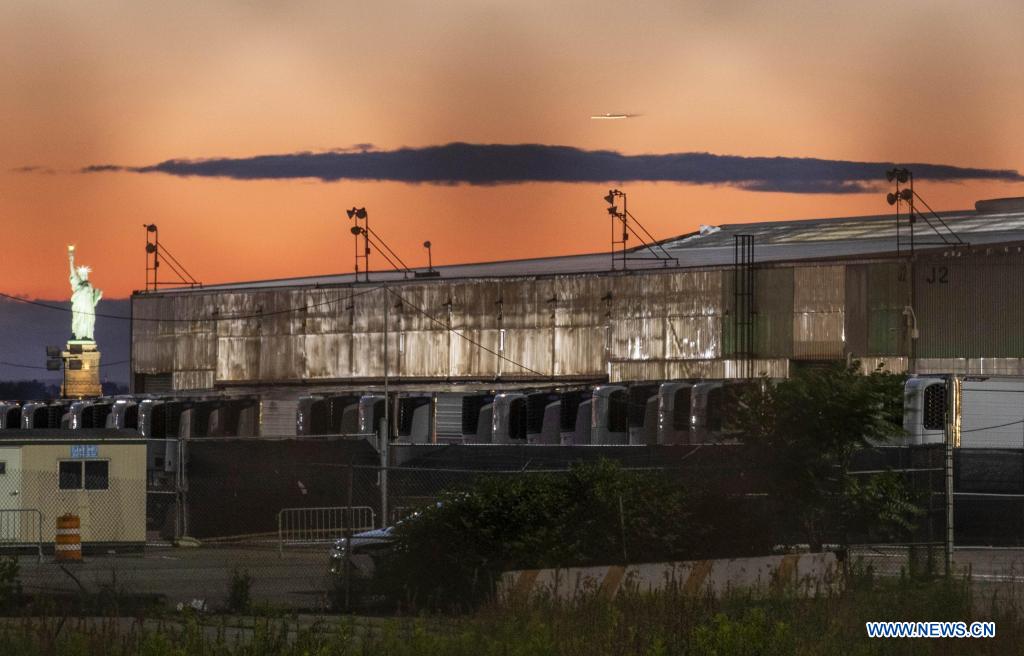Anti-COVID policies remain contentious in U.S. as cases surge in "steep fashion"

Refrigerated trailers are seen at a temporary morgue in Brooklyn, New York, the United States, June 15, 2021. Global COVID-19 cases surpassed 200 million on Wednesday, according to data from Johns Hopkins University. The global case count amounted to 200,014,602, with 4,252,873 deaths worldwide, as of 3:21 p.m. local time (1921 GMT), showed the data. (Xinhua/Wang Ying)
WASHINGTON, Aug. 5 (Xinhua) -- Masking, vaccination and lockdown policies remain contentious in the United States amid a rapid surge of COVID-19 cases driven by the Delta variant.
More than 18 months since COVID-19 hit its shores, the United States continues to debate the efficacy of mask-wearing as daily infections remain in the tens of thousands, in one of the world's worst containment efforts of the deadly disease.
STANDING IN YOUR WAY VS. GET OUT OF THE WAY
Florida Governor Ron DeSantis hit back at U.S. President Joe Biden on Wednesday, a day after the Democratic president criticized DeSantis and other Republican governors for banning mask mandates in public schools and other places.
"If you're trying to deny kids a proper in-person education, I'm going to stand in your way, and I'm going to stand up for the kids in Florida," DeSantis said at a news conference. "If you're trying to restrict people, impose mandates, if you're trying to ruin their jobs and their livelihoods and their small business, if you are trying to lock people down, I am standing in your way, and I'm standing for the people of Florida."
Biden said at the White House on Tuesday afternoon that a coordinated effort is needed to stem the virus's spread.
"We need leadership from everyone and if some governors aren't willing to do the right thing to beat this pandemic, then they should allow businesses and universities who want to do the right thing to be able to do it," he said.
"I say to these governors, please help. If you aren't going to help, at least get out of the way of people who are trying to do the right thing. Use your power to save lives," Biden added.
In a tweet responding to DeSantis's remarks Wednesday afternoon, White House Press Secretary Jen Psaki noted that 23 percent of new U.S. COVID-19 hospitalizations are in Florida and said the White House hopes DeSantis will join them in the fight against the pandemic.
DeSantis and Biden traded barbs as the United States is struggling with an increase of COVID-19 cases fueled by the more contagious Delta variant and millions of unvaccinated Americans.
COUNTRY COULD BE "IN TROUBLE"
The Delta variant accounted for an estimated 93.4 percent of all new COVID-19 cases in the United States during the last two weeks of July, according to figures published by the U.S. Centers for Disease Control and Prevention on Wednesday.
This number is even higher in certain parts of the country, showed the figures for the week ending July 31. In the Midwest including Iowa, Kansas, Missouri and Nebraska, Delta accounts for more than 98 percent of all cases.
These figures have shown a rapid increase over the past two months. In the two weeks ending May 22, Delta's prevalence was estimated at around 3 percent.
The daily average of new cases across the country over the past week rose to 66,606 per day, from 40,597 the previous week, an increase of more than 64 percent, according to official figures.
Almost 72,000 children and teens caught COVID-19 last week -- a "substantial" increase from a week earlier, the American Academy of Pediatrics reported Tuesday.
U.S. COVID-19 cases driven by the Delta variant are rising in a "very steep fashion" and may double to 200,000 a day in the fall, said Anthony Fauci, head of the National Institute of Allergy and Infectious Diseases, on Wednesday.
"Remember, just a couple of months ago, we were having about 10,000 cases a day," said Fauci in an interview. "I think you're likely going to wind up somewhere between 100,000 and 200,000 cases."
The United States could be "in trouble" entering the fall unless a large portion of unvaccinated Americans decide to get the shots, said Fauci.
"What we're seeing, because of this increase in transmissibility, and because we have about 93 million people in this country who are eligible to get vaccinated who don't get vaccinated -- that you have a significant pool of vulnerable people," he said.
The infectious disease expert said he is concerned the high number of unvaccinated people could lead to a stronger variant emerging that could reduce the efficacy of previously-administered vaccines.
"If we don't crush the outbreak to the point of getting the overwhelming proportion of the population vaccinated, then what will happen is the virus will continue to smolder through the fall into the winter, giving it ample chance to get a variant," Fauci said.
CONTENTIOUS POLICY DEBATES
Most unvaccinated American adults don't believe that COVID-19 vaccines are very effective and see the vaccines as a greater health risk than the virus itself, according to the Kaiser Family Foundation survey published Wednesday.
Fifty-three percent of unvaccinated adults believe the vaccine poses a bigger risk to their health than COVID-19 itself, while an overwhelming majority of 88 percent of vaccinated adults say that getting infected with COVID-19 is a bigger risk to their health than the vaccine.
Fifty-seven percent of unvaccinated adults also say that the news has "generally exaggerated" the seriousness of the pandemic, while three-fourths of vaccinated adults say the news has been "generally correct" or has "underestimated" its seriousness. Among those who say they will "definitely not" get a vaccine, 75 percent say the news is exaggerated.
"The sharply different views of the vaccinated and unvaccinated help to explain the contentiousness of ongoing policy debates about vaccine mandates," said the foundation.
For example, vaccinated adults are far more likely than unvaccinated adults to say the federal government should recommend employers require vaccination among their workers at 68 percent versus 16 percent. The public overall is split on the issue, with 51 percent saying employers should require vaccination compared to 45 percent who say they should not.
Vaccinated adults are also more likely to say they wear masks in grocery stores and other indoor places, at work, and in crowded outdoor settings.
"These differences are to a large degree driven by unvaccinated Republicans. Majorities of Republicans say they 'never' wear a mask outdoors in crowded outdoor places, at work, or in a grocery store. Democrats are more likely to report wearing a mask at least most of the time in all of these locations," said Kaiser.
The health-focused nonprofit group surveyed 1,500 U.S. adults between July 15 and 27 for this chapter of its survey, and found little change among those with the most hardened attitudes about vaccination. About 14 percent of those surveyed say they will "definitely not" get vaccinated -- the same proportion as in December.
Photos
Related Stories
- Chinese schools may postpone new semester over COVID-19
- Beijing to further step up epidemic prevention, control
- Wuhan launches mobile lab for COVID-19 nucleic acid testing
- U.S. infrastructure bill to add 256 bln USD to deficits over 10 years: CBO
- Linking climate change to COVID-19 ungrounded, western countries' historical responsibility for climate inescapable
Copyright © 2021 People's Daily Online. All Rights Reserved.










